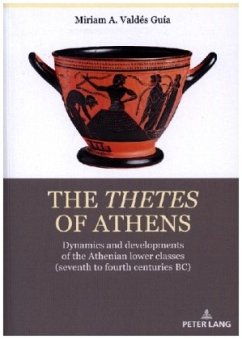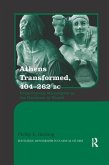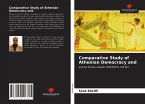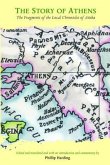Miriam Valdes Guia
The thetes of Athens
Dynamics and developments of the Athenian lower classes (seventh to fourth centuries BC)
Miriam Valdes Guia
The thetes of Athens
Dynamics and developments of the Athenian lower classes (seventh to fourth centuries BC)
- Broschiertes Buch
- Merkliste
- Auf die Merkliste
- Bewerten Bewerten
- Teilen
- Produkt teilen
- Produkterinnerung
- Produkterinnerung
The main aim of this book is to study the Athenian lower classes between the seventh and fourth centuries BC, with the emphasis on the thetes. The word thes had a double meaning in ancient Athens: a day labourer and/or wage earner (generally a pauper without land) and a member of the Solonian census class. Based on this scheme, the intention here is to examine the ways in which both meanings overlapped throughout that historical period. Within the framework of this evolution, the book addresses the different aspects that are necessary for understanding the meaning of the word thetes in…mehr
Andere Kunden interessierten sich auch für
![Athens Transformed, 404-262 BC Athens Transformed, 404-262 BC]() Phillip HardingAthens Transformed, 404-262 BC45,99 €
Phillip HardingAthens Transformed, 404-262 BC45,99 €![Courtesans at Table Courtesans at Table]() Laura McClureCourtesans at Table37,99 €
Laura McClureCourtesans at Table37,99 €![Athenian Letters: Or, the Epistolary Correspondence of an Agent of the King of Persia, Residing at Athens During the Peloponnsian War. C Athenian Letters: Or, the Epistolary Correspondence of an Agent of the King of Persia, Residing at Athens During the Peloponnsian War. C]() Philip Yorke HardwickeAthenian Letters: Or, the Epistolary Correspondence of an Agent of the King of Persia, Residing at Athens During the Peloponnsian War. C38,99 €
Philip Yorke HardwickeAthenian Letters: Or, the Epistolary Correspondence of an Agent of the King of Persia, Residing at Athens During the Peloponnsian War. C38,99 €![Comparative Study of Athenian Democracy and Comparative Study of Athenian Democracy and]() Sana BALDÉComparative Study of Athenian Democracy and36,99 €
Sana BALDÉComparative Study of Athenian Democracy and36,99 €![The Greek World in the Fourth Century The Greek World in the Fourth Century]() Lawrence A. Tritle (ed.)The Greek World in the Fourth Century40,99 €
Lawrence A. Tritle (ed.)The Greek World in the Fourth Century40,99 €![The Story of Athens The Story of Athens]() Phillip HardingThe Story of Athens38,99 €
Phillip HardingThe Story of Athens38,99 €![Papers of the American School of Classical Studies at Athens Papers of the American School of Classical Studies at Athens]() AnonymPapers of the American School of Classical Studies at Athens25,90 €
AnonymPapers of the American School of Classical Studies at Athens25,90 €-
-
-
The main aim of this book is to study the Athenian lower classes between the seventh and fourth centuries BC, with the emphasis on the thetes. The word thes had a double meaning in ancient Athens: a day labourer and/or wage earner (generally a pauper without land) and a member of the Solonian census class. Based on this scheme, the intention here is to examine the ways in which both meanings overlapped throughout that historical period. Within the framework of this evolution, the book addresses the different aspects that are necessary for understanding the meaning of the word thetes in relation to the social, economic, political and cultural status of those who were called as such. This involves identifying the different situations in which the thetes found themselves in ancient Athens over time. All these issues are addressed in this book diachronically, thus offering a comprehensive overview of the historical evolution of the Athenian lower classes.
Produktdetails
- Produktdetails
- Verlag: Peter Lang
- Artikelnr. des Verlages: 293221
- Seitenzahl: 460
- Erscheinungstermin: April 2025
- Englisch
- Abmessung: 210mm x 148mm
- Gewicht: 800g
- ISBN-13: 9783631932216
- Artikelnr.: 73136582
- Herstellerkennzeichnung Die Herstellerinformationen sind derzeit nicht verfügbar.
- Verlag: Peter Lang
- Artikelnr. des Verlages: 293221
- Seitenzahl: 460
- Erscheinungstermin: April 2025
- Englisch
- Abmessung: 210mm x 148mm
- Gewicht: 800g
- ISBN-13: 9783631932216
- Artikelnr.: 73136582
- Herstellerkennzeichnung Die Herstellerinformationen sind derzeit nicht verfügbar.
Miriam A. Valdés Guía is Professor in the Department of Prehistory, Ancient History and Archaeology at the Complutense University of Madrid. She has been coordinator of the master's in history and sciences of Antiquity and the PhD in Ancient World Studies at the same university and is currently directing the consolidated Research Group on Ancient Greek History of the department.
The thetes of Athens
Dynamics and developments of the Athenian lower classes (seventh-fourth centuries BC)
Miriam A. Valdés Guía
Universidad Complutense de Madrid
(Dedication of the book):
To Domingo Plácido, an excellent historian and good friend
In memory of my parents, Carmen and Pedro
TABLE OF CONTENTS
List of Tables
Foreword
Acknowledgements
List of Abbreviations
Introduction
PART I. Contextualising the thetes: seventh-century processes of degradation and enslavement
Chapter 1. A historiography of the thetes
Introduction
View of the thetes - 'hired labourers' - in social history since the mid-twentieth century
The term thetes and democracy in historiography
Conclusion
Chapter 2. The thetes and hektemoroi before Solon
The Homeric and Hesiodic thes
Thetes and hektemoroi in pre-Solonian Athens and the degradation of the peasantry
Hektermoroi as sharecroppers
Two situations among the peasantry
Conclusion
Chapter 3. Atimoi and agogimoi: reflections on debt slavery in archaic Athens
Introduction
Solon's Amnesty Law and the atimia penalty
Being 'deprived of rights' in seventh-century Athens and the status of pre-Solonian thetes
The meaning of agogimos in the pre-Solonian Athens and the Solonian restoration of atimoi
Conclusion
Chapter 4. Hybris in archaic Athens: the forms of exploitation and violence employed by the aristoi against the demos
Introduction
Economic exploitation
Physical violence
Ideological constraint
Institutional violence: 'justice'
Chapter 5. The cult of Zeus and the Attic peasantry: Dike and Zeus Eleutherios
Zeus, the giver of justice and agricultural prosperity
Zeus Eleutherios
PART II. The demos 'in the middle': integration and evolution of the lower classes in sixth-century Athens
Chapter 6. The social and cultural background of hoplite development in archaic Athens: Peasants, debts, zeugitai and Hoplethes
Introduction
Hesiod: independent farmer or member of the elite?
th (Sol. Fr. 36 W -30 G-P-, lin. 5 and 7): demos, debt and zeugitai
Hoplites in the collective imagination: Hoplethes, the giants in the Panathenaic Games and Heracles
Conclusion
Chapter 7. A new reading of Solon's law on stasis: the sovereignty of the demos
Introduction
The meaning of the expression 'th mi ni pi '. Taking up arms on behalf of the demos, the democracy, the polis or the fatherland
Solon and the assembly of the demos 'in the middle'
Solon's law on stasis and the Eretrian law against tyranny (and oligarchy)
A possible reconstruction of the Solonian formulation of the law
Conclusion
Chapter 8. The Attic demos in the sixth century: between agency (and political awareness) and clientelism
Introduction
The demos flocked en masse (pandemei) to the Acropolis and the Damasias episode
The social structure of seventh-century Athens
'Vertical' and 'horizontal' stasis
The demos in the political sphere and the followers of Pisistratus
The interconnection between 'vertical' and 'horizontal' stasis: Diakrioi and Hyperakrioi
The demos and the religious/cultural community of Attica under Pisistratus
The leading role and political agency of the demos after the tyranny
Chapter 9. Census' classes, dekate and demography in 6th Century Athens
Qualifications for the Solonian census classes
Dekate
Demography
Conclusion
PART III. The identity of the thetes and zeugitai in fifth-century democracy: political and military involvement
Chapter 10. Zeugitai in fifth-century Athens: social and economic qualification from Cleisthenes to the end of the Peloponnesian War
Introduction
Evidence on zeugitai in fifth century and the scholarly debate on the use of the census classes in the military organization
Hoplites and zeugitai: numbers, wealth, and land ownership in fifth-century Athens
Cleisthenes' measures: monetary requirements for belonging to the zeugite census class and military reforms
Conclusion
Chapter 11. Thetes, Athenian empire and demography
Introduction
The thetes as a population segment
Colonies and cleruchies
Benefits of the misthos and full employment
Conclusion
Chapter 12. Thetes epibatai in fifth-century Athens
Introduction
The Epibatai as hoplites with high socioeconomic status
Thetes epibatai
A note on the census classes and their role in fifth-century recruitment
Thetes demography
Possible allusions to thetes epibatai in the sources
Conclusion
Chapter 13. Socrates, as poor as a thes
Introduction
Socrates' poverty
Socrates, the sculptor (lithourgos)
Socrates: a thes or a zeugites?
Conclusion
Chapter 14. The 'Five Thousand' and the demos in the oligarchic coup of 411: eisphora and reform of the census classes
Introduction
The 'Five Thousand' in the regime of the Four Hundred and the eisphora levy during the Peloponnesian War
The 'Five Thousand' in the government of the Five Thousand
Conclusion
PART IV. The drift of the lower classes in the fourth century: towards the revival of dependencies
Chapter 15. The resurgence of dependency in the fourth century: the spaces of thetes and misthotoi, parasitoi and beggars
Introduction
The resurgence of rural wage labour and the leasing of land to the poor
Salaried work in the asty
Ptocheia
Benefits of citizenship, euergesia and parasitism
Conclusion
Chapter 16. Debt as a source of dependency and exploitation in classical Athens
Introduction
Public debtors
Private debtors
Charis
Conclusion
Chapter 17. Some brief notes on demographics, the eisphora and the diapsephismos in fourth-century Athens
Demographics
The Eisphora
The Diapsephismos of 346
Conclusion
Conclusions
Tables
Bibliography
List of Index terms
Dynamics and developments of the Athenian lower classes (seventh-fourth centuries BC)
Miriam A. Valdés Guía
Universidad Complutense de Madrid
(Dedication of the book):
To Domingo Plácido, an excellent historian and good friend
In memory of my parents, Carmen and Pedro
TABLE OF CONTENTS
List of Tables
Foreword
Acknowledgements
List of Abbreviations
Introduction
PART I. Contextualising the thetes: seventh-century processes of degradation and enslavement
Chapter 1. A historiography of the thetes
Introduction
View of the thetes - 'hired labourers' - in social history since the mid-twentieth century
The term thetes and democracy in historiography
Conclusion
Chapter 2. The thetes and hektemoroi before Solon
The Homeric and Hesiodic thes
Thetes and hektemoroi in pre-Solonian Athens and the degradation of the peasantry
Hektermoroi as sharecroppers
Two situations among the peasantry
Conclusion
Chapter 3. Atimoi and agogimoi: reflections on debt slavery in archaic Athens
Introduction
Solon's Amnesty Law and the atimia penalty
Being 'deprived of rights' in seventh-century Athens and the status of pre-Solonian thetes
The meaning of agogimos in the pre-Solonian Athens and the Solonian restoration of atimoi
Conclusion
Chapter 4. Hybris in archaic Athens: the forms of exploitation and violence employed by the aristoi against the demos
Introduction
Economic exploitation
Physical violence
Ideological constraint
Institutional violence: 'justice'
Chapter 5. The cult of Zeus and the Attic peasantry: Dike and Zeus Eleutherios
Zeus, the giver of justice and agricultural prosperity
Zeus Eleutherios
PART II. The demos 'in the middle': integration and evolution of the lower classes in sixth-century Athens
Chapter 6. The social and cultural background of hoplite development in archaic Athens: Peasants, debts, zeugitai and Hoplethes
Introduction
Hesiod: independent farmer or member of the elite?
th (Sol. Fr. 36 W -30 G-P-, lin. 5 and 7): demos, debt and zeugitai
Hoplites in the collective imagination: Hoplethes, the giants in the Panathenaic Games and Heracles
Conclusion
Chapter 7. A new reading of Solon's law on stasis: the sovereignty of the demos
Introduction
The meaning of the expression 'th mi ni pi '. Taking up arms on behalf of the demos, the democracy, the polis or the fatherland
Solon and the assembly of the demos 'in the middle'
Solon's law on stasis and the Eretrian law against tyranny (and oligarchy)
A possible reconstruction of the Solonian formulation of the law
Conclusion
Chapter 8. The Attic demos in the sixth century: between agency (and political awareness) and clientelism
Introduction
The demos flocked en masse (pandemei) to the Acropolis and the Damasias episode
The social structure of seventh-century Athens
'Vertical' and 'horizontal' stasis
The demos in the political sphere and the followers of Pisistratus
The interconnection between 'vertical' and 'horizontal' stasis: Diakrioi and Hyperakrioi
The demos and the religious/cultural community of Attica under Pisistratus
The leading role and political agency of the demos after the tyranny
Chapter 9. Census' classes, dekate and demography in 6th Century Athens
Qualifications for the Solonian census classes
Dekate
Demography
Conclusion
PART III. The identity of the thetes and zeugitai in fifth-century democracy: political and military involvement
Chapter 10. Zeugitai in fifth-century Athens: social and economic qualification from Cleisthenes to the end of the Peloponnesian War
Introduction
Evidence on zeugitai in fifth century and the scholarly debate on the use of the census classes in the military organization
Hoplites and zeugitai: numbers, wealth, and land ownership in fifth-century Athens
Cleisthenes' measures: monetary requirements for belonging to the zeugite census class and military reforms
Conclusion
Chapter 11. Thetes, Athenian empire and demography
Introduction
The thetes as a population segment
Colonies and cleruchies
Benefits of the misthos and full employment
Conclusion
Chapter 12. Thetes epibatai in fifth-century Athens
Introduction
The Epibatai as hoplites with high socioeconomic status
Thetes epibatai
A note on the census classes and their role in fifth-century recruitment
Thetes demography
Possible allusions to thetes epibatai in the sources
Conclusion
Chapter 13. Socrates, as poor as a thes
Introduction
Socrates' poverty
Socrates, the sculptor (lithourgos)
Socrates: a thes or a zeugites?
Conclusion
Chapter 14. The 'Five Thousand' and the demos in the oligarchic coup of 411: eisphora and reform of the census classes
Introduction
The 'Five Thousand' in the regime of the Four Hundred and the eisphora levy during the Peloponnesian War
The 'Five Thousand' in the government of the Five Thousand
Conclusion
PART IV. The drift of the lower classes in the fourth century: towards the revival of dependencies
Chapter 15. The resurgence of dependency in the fourth century: the spaces of thetes and misthotoi, parasitoi and beggars
Introduction
The resurgence of rural wage labour and the leasing of land to the poor
Salaried work in the asty
Ptocheia
Benefits of citizenship, euergesia and parasitism
Conclusion
Chapter 16. Debt as a source of dependency and exploitation in classical Athens
Introduction
Public debtors
Private debtors
Charis
Conclusion
Chapter 17. Some brief notes on demographics, the eisphora and the diapsephismos in fourth-century Athens
Demographics
The Eisphora
The Diapsephismos of 346
Conclusion
Conclusions
Tables
Bibliography
List of Index terms
The thetes of Athens
Dynamics and developments of the Athenian lower classes (seventh-fourth centuries BC)
Miriam A. Valdés Guía
Universidad Complutense de Madrid
(Dedication of the book):
To Domingo Plácido, an excellent historian and good friend
In memory of my parents, Carmen and Pedro
TABLE OF CONTENTS
List of Tables
Foreword
Acknowledgements
List of Abbreviations
Introduction
PART I. Contextualising the thetes: seventh-century processes of degradation and enslavement
Chapter 1. A historiography of the thetes
Introduction
View of the thetes - 'hired labourers' - in social history since the mid-twentieth century
The term thetes and democracy in historiography
Conclusion
Chapter 2. The thetes and hektemoroi before Solon
The Homeric and Hesiodic thes
Thetes and hektemoroi in pre-Solonian Athens and the degradation of the peasantry
Hektermoroi as sharecroppers
Two situations among the peasantry
Conclusion
Chapter 3. Atimoi and agogimoi: reflections on debt slavery in archaic Athens
Introduction
Solon's Amnesty Law and the atimia penalty
Being 'deprived of rights' in seventh-century Athens and the status of pre-Solonian thetes
The meaning of agogimos in the pre-Solonian Athens and the Solonian restoration of atimoi
Conclusion
Chapter 4. Hybris in archaic Athens: the forms of exploitation and violence employed by the aristoi against the demos
Introduction
Economic exploitation
Physical violence
Ideological constraint
Institutional violence: 'justice'
Chapter 5. The cult of Zeus and the Attic peasantry: Dike and Zeus Eleutherios
Zeus, the giver of justice and agricultural prosperity
Zeus Eleutherios
PART II. The demos 'in the middle': integration and evolution of the lower classes in sixth-century Athens
Chapter 6. The social and cultural background of hoplite development in archaic Athens: Peasants, debts, zeugitai and Hoplethes
Introduction
Hesiod: independent farmer or member of the elite?
th (Sol. Fr. 36 W -30 G-P-, lin. 5 and 7): demos, debt and zeugitai
Hoplites in the collective imagination: Hoplethes, the giants in the Panathenaic Games and Heracles
Conclusion
Chapter 7. A new reading of Solon's law on stasis: the sovereignty of the demos
Introduction
The meaning of the expression 'th mi ni pi '. Taking up arms on behalf of the demos, the democracy, the polis or the fatherland
Solon and the assembly of the demos 'in the middle'
Solon's law on stasis and the Eretrian law against tyranny (and oligarchy)
A possible reconstruction of the Solonian formulation of the law
Conclusion
Chapter 8. The Attic demos in the sixth century: between agency (and political awareness) and clientelism
Introduction
The demos flocked en masse (pandemei) to the Acropolis and the Damasias episode
The social structure of seventh-century Athens
'Vertical' and 'horizontal' stasis
The demos in the political sphere and the followers of Pisistratus
The interconnection between 'vertical' and 'horizontal' stasis: Diakrioi and Hyperakrioi
The demos and the religious/cultural community of Attica under Pisistratus
The leading role and political agency of the demos after the tyranny
Chapter 9. Census' classes, dekate and demography in 6th Century Athens
Qualifications for the Solonian census classes
Dekate
Demography
Conclusion
PART III. The identity of the thetes and zeugitai in fifth-century democracy: political and military involvement
Chapter 10. Zeugitai in fifth-century Athens: social and economic qualification from Cleisthenes to the end of the Peloponnesian War
Introduction
Evidence on zeugitai in fifth century and the scholarly debate on the use of the census classes in the military organization
Hoplites and zeugitai: numbers, wealth, and land ownership in fifth-century Athens
Cleisthenes' measures: monetary requirements for belonging to the zeugite census class and military reforms
Conclusion
Chapter 11. Thetes, Athenian empire and demography
Introduction
The thetes as a population segment
Colonies and cleruchies
Benefits of the misthos and full employment
Conclusion
Chapter 12. Thetes epibatai in fifth-century Athens
Introduction
The Epibatai as hoplites with high socioeconomic status
Thetes epibatai
A note on the census classes and their role in fifth-century recruitment
Thetes demography
Possible allusions to thetes epibatai in the sources
Conclusion
Chapter 13. Socrates, as poor as a thes
Introduction
Socrates' poverty
Socrates, the sculptor (lithourgos)
Socrates: a thes or a zeugites?
Conclusion
Chapter 14. The 'Five Thousand' and the demos in the oligarchic coup of 411: eisphora and reform of the census classes
Introduction
The 'Five Thousand' in the regime of the Four Hundred and the eisphora levy during the Peloponnesian War
The 'Five Thousand' in the government of the Five Thousand
Conclusion
PART IV. The drift of the lower classes in the fourth century: towards the revival of dependencies
Chapter 15. The resurgence of dependency in the fourth century: the spaces of thetes and misthotoi, parasitoi and beggars
Introduction
The resurgence of rural wage labour and the leasing of land to the poor
Salaried work in the asty
Ptocheia
Benefits of citizenship, euergesia and parasitism
Conclusion
Chapter 16. Debt as a source of dependency and exploitation in classical Athens
Introduction
Public debtors
Private debtors
Charis
Conclusion
Chapter 17. Some brief notes on demographics, the eisphora and the diapsephismos in fourth-century Athens
Demographics
The Eisphora
The Diapsephismos of 346
Conclusion
Conclusions
Tables
Bibliography
List of Index terms
Dynamics and developments of the Athenian lower classes (seventh-fourth centuries BC)
Miriam A. Valdés Guía
Universidad Complutense de Madrid
(Dedication of the book):
To Domingo Plácido, an excellent historian and good friend
In memory of my parents, Carmen and Pedro
TABLE OF CONTENTS
List of Tables
Foreword
Acknowledgements
List of Abbreviations
Introduction
PART I. Contextualising the thetes: seventh-century processes of degradation and enslavement
Chapter 1. A historiography of the thetes
Introduction
View of the thetes - 'hired labourers' - in social history since the mid-twentieth century
The term thetes and democracy in historiography
Conclusion
Chapter 2. The thetes and hektemoroi before Solon
The Homeric and Hesiodic thes
Thetes and hektemoroi in pre-Solonian Athens and the degradation of the peasantry
Hektermoroi as sharecroppers
Two situations among the peasantry
Conclusion
Chapter 3. Atimoi and agogimoi: reflections on debt slavery in archaic Athens
Introduction
Solon's Amnesty Law and the atimia penalty
Being 'deprived of rights' in seventh-century Athens and the status of pre-Solonian thetes
The meaning of agogimos in the pre-Solonian Athens and the Solonian restoration of atimoi
Conclusion
Chapter 4. Hybris in archaic Athens: the forms of exploitation and violence employed by the aristoi against the demos
Introduction
Economic exploitation
Physical violence
Ideological constraint
Institutional violence: 'justice'
Chapter 5. The cult of Zeus and the Attic peasantry: Dike and Zeus Eleutherios
Zeus, the giver of justice and agricultural prosperity
Zeus Eleutherios
PART II. The demos 'in the middle': integration and evolution of the lower classes in sixth-century Athens
Chapter 6. The social and cultural background of hoplite development in archaic Athens: Peasants, debts, zeugitai and Hoplethes
Introduction
Hesiod: independent farmer or member of the elite?
th (Sol. Fr. 36 W -30 G-P-, lin. 5 and 7): demos, debt and zeugitai
Hoplites in the collective imagination: Hoplethes, the giants in the Panathenaic Games and Heracles
Conclusion
Chapter 7. A new reading of Solon's law on stasis: the sovereignty of the demos
Introduction
The meaning of the expression 'th mi ni pi '. Taking up arms on behalf of the demos, the democracy, the polis or the fatherland
Solon and the assembly of the demos 'in the middle'
Solon's law on stasis and the Eretrian law against tyranny (and oligarchy)
A possible reconstruction of the Solonian formulation of the law
Conclusion
Chapter 8. The Attic demos in the sixth century: between agency (and political awareness) and clientelism
Introduction
The demos flocked en masse (pandemei) to the Acropolis and the Damasias episode
The social structure of seventh-century Athens
'Vertical' and 'horizontal' stasis
The demos in the political sphere and the followers of Pisistratus
The interconnection between 'vertical' and 'horizontal' stasis: Diakrioi and Hyperakrioi
The demos and the religious/cultural community of Attica under Pisistratus
The leading role and political agency of the demos after the tyranny
Chapter 9. Census' classes, dekate and demography in 6th Century Athens
Qualifications for the Solonian census classes
Dekate
Demography
Conclusion
PART III. The identity of the thetes and zeugitai in fifth-century democracy: political and military involvement
Chapter 10. Zeugitai in fifth-century Athens: social and economic qualification from Cleisthenes to the end of the Peloponnesian War
Introduction
Evidence on zeugitai in fifth century and the scholarly debate on the use of the census classes in the military organization
Hoplites and zeugitai: numbers, wealth, and land ownership in fifth-century Athens
Cleisthenes' measures: monetary requirements for belonging to the zeugite census class and military reforms
Conclusion
Chapter 11. Thetes, Athenian empire and demography
Introduction
The thetes as a population segment
Colonies and cleruchies
Benefits of the misthos and full employment
Conclusion
Chapter 12. Thetes epibatai in fifth-century Athens
Introduction
The Epibatai as hoplites with high socioeconomic status
Thetes epibatai
A note on the census classes and their role in fifth-century recruitment
Thetes demography
Possible allusions to thetes epibatai in the sources
Conclusion
Chapter 13. Socrates, as poor as a thes
Introduction
Socrates' poverty
Socrates, the sculptor (lithourgos)
Socrates: a thes or a zeugites?
Conclusion
Chapter 14. The 'Five Thousand' and the demos in the oligarchic coup of 411: eisphora and reform of the census classes
Introduction
The 'Five Thousand' in the regime of the Four Hundred and the eisphora levy during the Peloponnesian War
The 'Five Thousand' in the government of the Five Thousand
Conclusion
PART IV. The drift of the lower classes in the fourth century: towards the revival of dependencies
Chapter 15. The resurgence of dependency in the fourth century: the spaces of thetes and misthotoi, parasitoi and beggars
Introduction
The resurgence of rural wage labour and the leasing of land to the poor
Salaried work in the asty
Ptocheia
Benefits of citizenship, euergesia and parasitism
Conclusion
Chapter 16. Debt as a source of dependency and exploitation in classical Athens
Introduction
Public debtors
Private debtors
Charis
Conclusion
Chapter 17. Some brief notes on demographics, the eisphora and the diapsephismos in fourth-century Athens
Demographics
The Eisphora
The Diapsephismos of 346
Conclusion
Conclusions
Tables
Bibliography
List of Index terms








